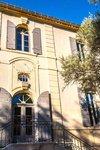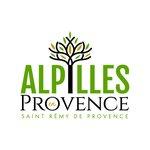1. SAINT ETIENNE DU GRES - Le tour des Alpilles à vélo, jour 1
Cette première journée vous amène à découvrir la partie sud-ouest du massif des Alpilles. Voyagez de l'époque romaine à l'aire napoléonienne, au fil des villages provençaux que vous traverserez et du patrimoine dont ils recèlent. Entre la vallée des Baux et la plaine de la Crau, profitez aussi d'un terroir reconnu par plusieurs AOP, dont les productions sauront régaler vos papilles.
13 points of interest
 Savoir-faire
Savoir-faireLes Olivades
Léonard Quinche joined forces in 1818 with two Tarasconnais and created an Indian factory in Saint-Etienne du Grès. In 1948, the company is taken over by Pierre Boudin. In 1977, he created "Les Olivades", a family business that perpetuates the ancestral art of printing on fabric from the south of France, while adapting it to the current life. The Les Olivades brand has been a forerunner in terms of high-end products manufactured and sold by the same company.
 Water and rivers
Water and riversRambaille Pond
The Rambaille pond is one of the few lakes of the Alpilles. Artificial and in which one it is forbidden to swim, it draws its water in the Vigueirat canal and has an area of ??2.5 hectares. It makes the happiness of the fishing lovers from the surroundings. Most white-fleshed fish, as well as pike, trout and zander can be caught.
 Patrimony and history
Patrimony and historySaint-Gabriel Chapel
In the early Middle Ages, a first church was erected instead of an old pagan place of worship. Dedicated to the Archangel Gabriel, it is an important step on the road to Santiago de Compostela. The current chapel was built in the 12th century. and testifies to the splendor of the beginnings of Romanesque art in Provence, as shown by its architecture: its facade, its monumental portal, its carved friezes, or its oculus decorated with symbols of the four evangelists.
 Patrimony and history
Patrimony and historyThe mill of Alphonse Daudet
Between the 18th and early 20th century, Fontvieille lived to the rhythm of the windmills. Built on a rocky promontory, four mills cap the surrounding hills of Fontvieille. Moulin de Daudet, the most recent of the four built mills stopped working in 1914. It was transformed in 1935, paying tribute to the famous writer Alphonse Daudet who portrayed through the tale "Lettres de mon moulin" (Letters from my mill), the consequences of technical changes at that time. Patrimony and history
Patrimony and historyThe Roman aqueduct of Barbegal and the remains of the Roman flour mill
The Roman colony of Arles is endowed itself, around the 1st century AD, with a water supply system using two aqueducts built at the foot of the Alpilles, where you can still find remains today. To the south of the massif, a first aqueduct of about 10km brought water from several springs, collected over Maussane and Paradou. A second aqueduct showing its first remains between Eygalières and Mollégès, went from Fontvieille, where its water mixed with that of the southern aqueduct. The Barbegal flour mill, dated of the 2nd century AD, seems to have worked only a century to supply the population of Arles with wheat. Patrimony and history
Patrimony and historyBarbegal hydraulic mill
This mill was built in the 2nd century. and would have served 100 years. Built in a hillside on a slope of 30 ° and fed by the eastern branch of the Barbegal aqueduct, this mill consisted of two parallel rows of eight water wheels that operated sixteen mills. It formed a rectangle measuring 42 by 20 meters and produced about 4.5 tons of flour a day.
 Patrimony and history
Patrimony and historyRoman aqueduct of Barbegal
In the 1st century AD, the Romans built two parallel aqueduct bridges, which converged in a basin from which a single conduit leading to Arles. The Barbegal aqueduct was diverted in the 2nd century. AD to feed the Barbegal mill, while the western branch continued to supply the city of Arles. The modified bridge trenched the link of the Pene to feed the mill. The waters were then collected by a channel that evacuated them into marshes.
 Patrimony and history
Patrimony and historyThe village of Paradou
Formerly kniwn as Saint-Martin-de-Castillon, the current name "Paradou" comes, not from "Paradise" although it may seem like one to inhabitants or visitors, but the name of the old water mills of the Arcoule river which enabled weavers to "decorate" the sheets.
 Water and rivers
Water and riversBridge-canal of the Baux valley
In the Alpilles massif, numerous hydraulic structures have been built to supply all municipalities with water. The canal of the Baux valley, put in operation since July 3, 1914, passes along the southern foothills of the massif. The specificity of this environment associated with that of a canal, which must include a gentle slope allowing the good flow of water, led to the development of several canal bridges in the municipalities of Maussane-les-Alpilles and the Paradou.
 Patrimony and history
Patrimony and historyMural by Jean-Claude Quilici
This mural was realized in 2014 by 35 students under the mentorship of the artist Jean-Claude Quilici. The latter is a painter of Corsican origin, born in Marseille in 1941, who has a workshop in Maussane-les-Alpilles. Specialized in Provencal painting, he exhibited in the largest French, American and Japanese galleries. ;Among other things, he has created a 40m by 4m mural for the University of Corte and a 130m long mural for the Marseille metro.
 Water and rivers
Water and riversNapoleon III wash house
This Second Empire wash house style (Napoleon III), was inaugurated on March 26, 1865, after having been realized by the Avignon architect Louis Astruc. The inhabitants of the town came there to do their laundry, making an important social meeting place. For the period this wash house presented a great particularity : It allowed to do the laundry standing, and no longer on the knees. ;
 Patrimony and history
Patrimony and historySt. Roch oratory
Topped on a central pillar in stone, this small chapel was built in 1822, against cholera raging in the region. A niche was built, bullet-shaped, covered by a stone flat roof. A marble plaque was added to the building, where one can read "SAINT ROCH PRIEZ FOR US. 1822-1886 ".
 Patrimony and history
Patrimony and historyThe Saint-Jacques-le-Majeur
The church is the place of the Saint-Jacques chapel, they found writings dating from the eleventh century. and has been replaced to accommodate the growing number of parishioners. The building in front of you dates from 1783. He has had several downgrades during the Revolution, but also following the 1909 earthquake that caused the collapse of the bell tower.
Description
Dos au parking, suivre à droite la D32, direction Fontvieille. A l’intersection avec la D33, l’emprunter à gauche. Après 500 m, bifurquer à droite sur la draille des Joncs. Au bout, retrouver la D33 et rejoindre Fontvieille par la droite.
1- Au rond-point, prendre à gauche, puis au carrefour continuer tout droit. Après 2,5 km, tourner à gauche sur la route, direction «Aqueduc Romain ». La suivre sur 6 km jusqu’au centre-bourg du Paradou.
2- Au croisement, continuer sur l’avenue Jean Bessat. Emprunter la D17 à droite, puis à gauche la D78b direction Les Baux. Au bout, suivre à droite la D78f. 1 km plus loin, bifurquer à droite sur la D27 et rejoindre le centre-bourg de Maussane.
3- Au croisement avec la D17, tourner à gauche. Après 800 m, prendre à gauche la D5, direction Eygalières. Au carrefour suivant, suivre à droite la direction «Le Petit Roman ». Poursuivre sur cette route jusqu'à l'intersection avec la D17.
4- Tourner à gauche sur le chemin d'Alphonse Daudet, avant la D17, et continuer jusqu’au rond-point. Prendre à droite pour retrouver le centre-bourg et la Maison du Tourisme de Mouriès.
- Departure : Parking de la Salle des Fêtes, Saint-Etienne du Grès
- Arrival : Mouriès
- Towns crossed : Saint-Étienne-du-Grès, Tarascon, Fontvieille, Paradou, Les Baux-de-Provence, Maussane-les-Alpilles, and Mouriès
Forecast
Altimetric profile
Recommandations
L'itinéraire se faisant en 3 jours, penser à réserver un hébergement en fonction de la distance journalière à parcourir. Contacter les Offices de Tourisme Alpilles-en-Provence, Maussane-les-Alpilles, et les Bureaux d'Informations Touristiques d'Eyguières et Orgon.
Pour votre sécurité, et pour la préservation des massifs forestiers, l'accès aux espaces naturels est règlementé de juin à septembre. Renseignez-vous pendant la période estivale au 08 11 20 13 13 (prix d'un appel local) ou sur www.bouches-du-rhone.pref.gouv.fr Téléchargez gratuitement l'application MYPROVENCE ENVIE DE BALADE (disponible sur Appstore et Android Market).
Information desks
House of the Alpilles Regional Nature Park
2, boulevard Marceau, 13210 Saint-Rémy-de-Provence
Located in the heart of the city centre of Saint-Rémy-de-Provence, the House of the Alpilles Nature Park welcomes you to its completely renovated premises. This new vibrant place is multifunctional: it accommodates the Park's engineering team but also has a public reception space and showrooms. A true resource centre of the Park's heritage, it aims to support and promote locals, visitors and tourists on all 16 municipalities of the Park.
Open Monday to Friday, from 9 am at 12:30 pm and from 1:30 pm to 5 pm.
Free admission.
OTI Alpilles-en-Provence
Place Jean Jaurès, 13210 Saint-Rémy-de-Provence
Transport
Access and parking
Parking :
Accessibility
Report a problem or an error
If you have found an error on this page or if you have noticed any problems during your hike, please report them to us here:


